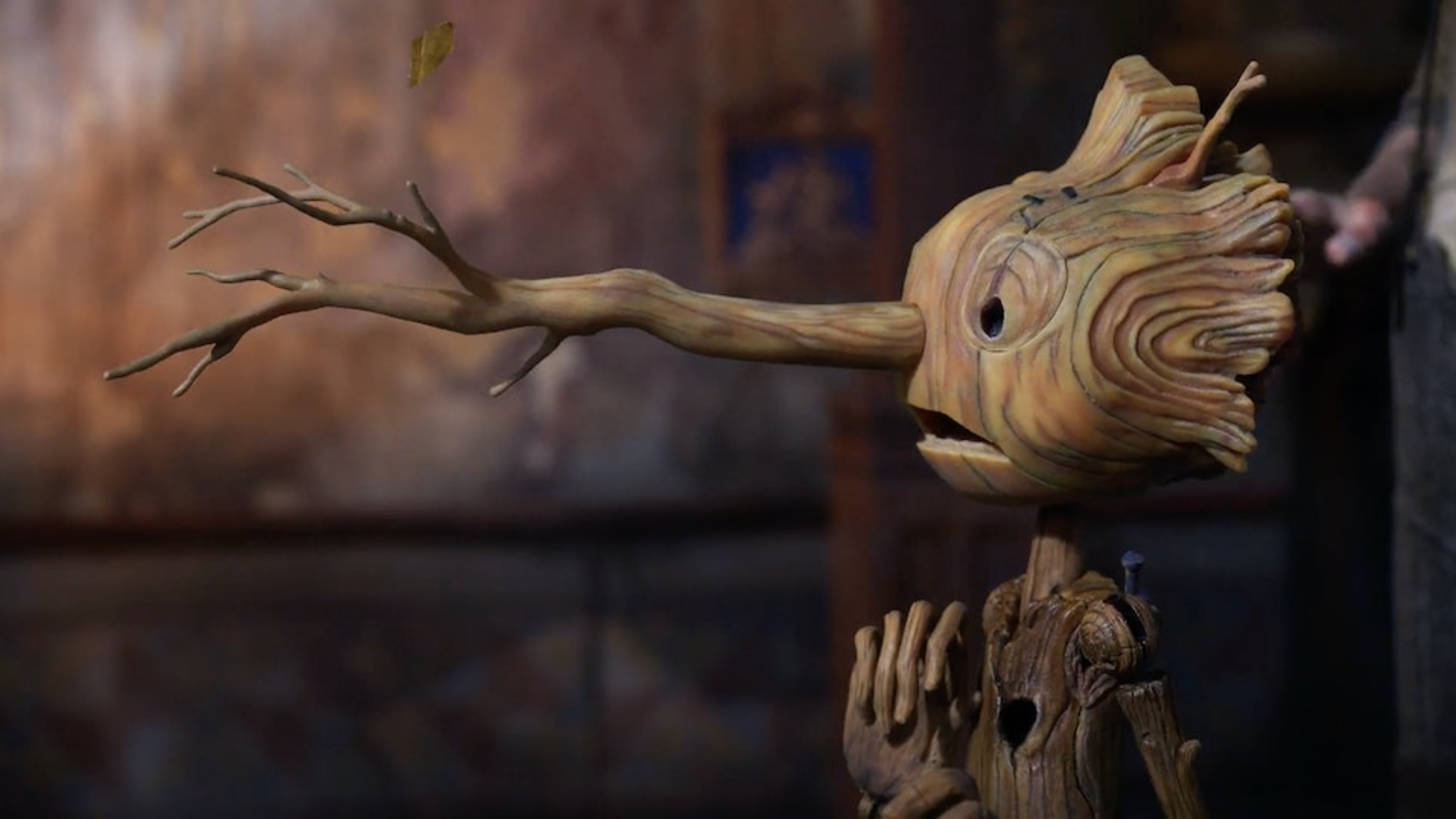GUILLERMO DEL TORO'S PINOCCHIO
Directing: B+
Acting: B+
Writing: B+
Cinematography: A-
Editing: B+
Animation: A-
The stop motion animation in Guillermo del Toro’s Pinoicchio may be the best I have ever seen. It’s not quite perfect, but then stop-motion never is. Usually it’s a lot easier to see how it’s done, with diorama scenes shot frame by frame, but for the most part in this film, the character movements are almost shockingly fluid. I can’t imagine the hours that would have had to go into this, and still, this is the longest stop-motion film ever made. (It clocks in at an hour and fifty-seven minutes, although the animation gives way to extended end credits at about 1:50.) The fact that virtually every frame is a uniquely beautiful work of art makes it all that much more of an achievement.
I only wish I could have seen it in a theater. It was released in select theaters on November 9, but apparently not in my local market—both rare and a disappointment. Now, exactly one month later and as of December 9, it is streaming on Netflix. At least a lot more people will now actually be able to see it, I guess. Will they bother, with Netflix’s massive library to choose from? It would seem so: it remains in their top 10 movies currently. Perhaps one day they will figure out they can get the best of both worlds by giving their movies a wide release in theaters, after which millions will still watch it streaming. I would have much preferred seeing this wonderful film in a cinema, but I’m just glad it exists.
Presumably co-writer and co-director Guillermo del Toro’s name is part of this film’s official title in order to differentiate itself from the critically reviled Disney live action version that was also released, all of three months ago. This one might as well be called The Pinocchio Movie Worth Watching.
Parents of small children may well want to be strongly cautioned, however. This is still del Toro we’re talking about: this film goes into some weird, very dark places. I can’t remember another animated feature film that deals with death so frankly—and so extensively. The entire narrative is bookended by deaths pivotal to the plot, and one of the story threads is about Pinocchio himself being impervious to death. Except, because this is a Guillermo del Toro film, Pinocchio is killed and revived several times, each time spending longer in a netherworld populated by card playing rabbit skeletons and a magical Chimera voiced by (naturally) Tilda Swinton. It should be noted that none of this suggests permanent immortality, as human death in this world is indeed permanent, and the rules are different for Pinocchio because he isn’t actually a real boy.
He is, however, a gift offered to Geppetto (David Bradley) by the Chimera’s empathetic sister Wood Sprite (also voiced by Tilda Swinton), in a misguided attempt to ease his grief still unabated many years after the death of his ten-year-old son, Carlo. Both Carlo and Pinocchio are voiced by the immensely talented Gregory Mann, a pubescent boy with a heavenly voice. (His voice reportedly changed during production, necessitating the editing of his voice to match how it sounded from the start.) I didn’t really expect this Pinocchio to be a musical, but it technically is, with characters breaking out into song, albeit not particularly frequently. The songs themselves are just fine, but the voices across the board are wonderful—including that of Ewan McGregor as Cricket. He sounds even better now than he did in the 2001 smash Moulin Rouge!
Cricket, incidentally, provides some much-needed comic relief in an otherwise rather dark movie. This humor itself is also dark much of the time (he keeps getting squished and saying things like “Life is such hideous pain,” which ironically brought me endless joy). In addition to McGregor, though, this deeply stacked cast also includes Christoph Waltz as the villanous carnival puppetmaster; Ron Perlman as a fascist government official in this film del Toro chose to set in World War II Italy; John Turturro as the local village doctor; Tim Blake Nelson as the aforementioned Black Rabbits (apparently based on “Undertaker Rabbits” from the original story). Most amusing of all is Cate Blanchett, who was reportedly so eager to be a part of this film that, when it was the only part left, she happily took the part of Spazzatura, an assistant carnival monkey who speaks almost exclusively in squawks and grunts.
All of these elements combined to leave me thoroughly charmed by Guillermo del Toro’s Pinocchio, which is both recognizably a product of his mind and a uniquely imaginative venture, narratively as well as visually. It does feel a bit more skewed toward adult interests, but it is appropriately rated PG, and older children may enjoy it. They may also be disturbed by it. And that is honestly the most fun thing about it.
Therein lies a rich world of discovery.
Overall: B+

